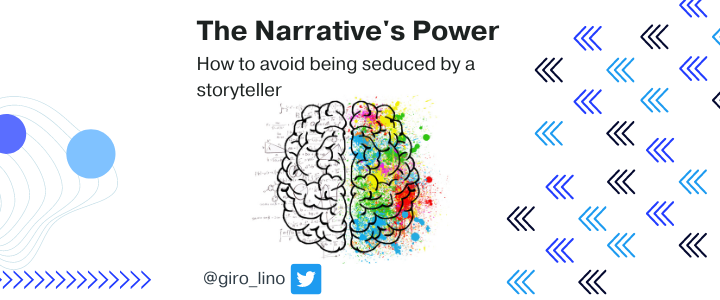Trending Assets
Top investors this month
Trending Assets
Top investors this month
The Narrative's Power

To read the entire post, access our blog.
As we commented on Twitter on Saturday, we’re releasing a new post about Stone, its valuation process, and how each engine affects the overall picture.
So far, between updates, and deep dives, we have written twelve posts about the company, totaling over 180 pages in content.
Even though we’re proud of creating that amount of content in such a short time, we haven’t had such much about our thoughts on how to evaluate our writing.
Regardless of how careful we’re researching and reading someone else’s write-up, we might be charmed by a good storyteller, although we theoretically know how to shield our minds.
If you have been following us since our inception, you probably noticed that we are left-brainers (logical). More recently, we’ve been developing a new set of skills for storytelling.
For that, we see ourselves in the position of helping investors and equity research analysts to develop a set of soft skills when reading someone else’s writings.
We Are Irrational
We inevitably have to deal with various individuals who stir up trouble and make our lives difficult throughout our lives.
They can be aggressive or passive-aggressive, but they are generally masters at playing on our emotions. They often appear charming and refreshingly confident, brimming with ideas and enthusiasm.
Only when it’s too late, do we discover that their confidence is irrational and their ideas ill-conceived.
What inevitably happens in these situations is that we are caught off guard, not expecting such behavior. Often this type will hit us with elaborate cover stories to justify their actors or blame handy scapegoats.
We might protest or become confused and drawn into a drama they control. We might protest or become angry, but we feel somewhat helpless in the end — the damage is done.
We catch ourselves falling into self-destructive behavior patterns that we cannot seem to control in these situations.
If we really understood the roots of human behavior, it would be much harder for the more destructive types to continually get away with their actions. We would not be charmed and easily misled.
But why? What if we could see the source of our more troubling emotions and why they drive our behavior, often against our wishes?
Understanding that stranger within us would help us realize that it’s not a stranger at all but a very much a part of ourselves.
And with that awareness, we would be able to break the negative patterns in our lives, stop making excuses for ourselves, and gain better control of what we do and what happens to us.
Having a clear understanding of ourselves and others could change our lives. But first, we must clear up a common misconception: we believe ourselves as rational.
Look at greed, for instance. We usually identify a specific excuse or a group as the cause of this emotion. But if we were honest with ourselves, we would see that what triggers our greed has deeper roots.
We can discern the patterns if we look — when this or that happens, we get greedy. But at the moment, in getting greedy, we are not reflective or rational — we merely ride the emotion and take unnecessary risks.
Nevertheless, we like to imagine ourselves in control of the situation, planning the course of our investments as best as we can. But we are largely unaware of how emotions drive us.
To continue reading the post for free, access our blog.
Giro's Newsletter
Giro's Newsletter
An independent investment newsletter that offers insightful analysis of LatAm's most incredible businesses and impacting events. Join +1,000 subscribers.
Already have an account?